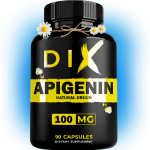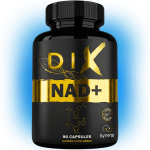
Do you often feel tired despite an impeccable lifestyle? Have you noticed a decrease in your muscle recovery or a drop in your athletic performance? It might be that your body is lacking NAD+, this important molecule for energy production in your cells. In this article, we will explore in detail the level of NAD+, its crucial role in energy metabolism, and how to optimize your healthy NAD levels to improve your cellular health and vital functions.
Reminder of what NAD is
What is NAD+ and why is it so important?
NAD⁺, short for Nicotinamide Adenine Dinucleotide, is a coenzyme present in all our cells. Its main function is to transport electrons, allowing it to participate in more than 500 vital enzymatic reactions in our body. This molecule is therefore a fundamental pillar of proper cellular function.
The two forms of NAD and their balance
NAD exists in two forms: NAD⁺, which captures electrons, and NADH, which transfers them to the mitochondria. A balance between these two forms is necessary to maintain a healthy energy metabolism. An imbalance can disrupt energy production and accelerate cellular aging.
NAD+: a key player in energy production
NAD⁺ acts as an electron carrier, capturing energy from nutrients to deliver it to the mitochondria, the true energy factories. This exchange allows the synthesis of ATP, the energy currency of cells. A deficit in NAD⁺ directly reduces the capacity to produce energy.
Multiple roles beyond energy production
NAD⁺ is involved in DNA repair, proper mitochondrial function, and gene expression control. These multiple functions make it a strategic target for cellular health. By facilitating the repair of cellular damage, it contributes directly to longevity and the prevention of age-related diseases.
The decline of NAD+ with age
From the age of 30, our body produces less NAD⁺ while degrading more of it through enzymes like CD38. This double age-related pressure explains the drop in NAD⁺ levels, particularly marked if the lifestyle is inadequate. This decline progressively affects cellular vitality.
Consequences of insufficient NAD+ levels
A low NAD⁺ level results in reduced energy, slowed muscle recovery, persistent mental fog, loss of skin radiance, erratic metabolism, and increased chronic inflammation. These effects, visible both at the cellular and systemic level, highlight the importance of this coenzyme for overall health.
Symptoms of NAD+ deficiency
The signs of insufficient NAD+ levels include:
- Reduced energy: Fewer NAD+ trucks to transport hidden energy from food to mitochondria
- Slowed muscle recovery: Less effective DNA repair and cellular regeneration
- Persistent mental fog: An NAD+/NADH imbalance affects mental clarity
- Loss of skin radiance: Accelerated skin aging reflects advanced cellular aging
- Erratic metabolism: Insulin resistance and weight gain despite efforts
Detecting a low NAD+ level mainly relies on observing these symptoms, although a blood test remains the most reliable method to accurately assess its status.
[Insert widget here: Calculator/Comparison Table] Title: Main functions of NAD+ and health impact. Columns: Function, Mechanism, Impact. Rows: Energy, DNA, Signaling, Immunity.
[Insert widget here: Call to Action] Product: NMN DIX. Benefits: Increases NAD+, Endurance, Energy, Longevity, 99.9% Purity. Button: Buy NAD+ DIX.
Optimizing NAD+ levels: approaches and strategies
The importance of NAD+ precursors to increase levels
NAD+ precursors are molecules that your body can convert into NAD+. NAD⁺ precursors are often sold and used for their supposed longevity effects, but it is important to be informed about potential risks, as explained in this detailed article. These molecules go through a series of metabolic steps to produce usable NAD+ for your cells. Contrary to some sellers’ claims, direct intake of pure NAD+ is ineffective. Your digestive system degrades this molecule before it can be used by your cells. Precursors like NR and NMN, however, navigate this path smoothly to allow your cells to produce NAD+ directly inside.
Main precursors and their comparative effectiveness
Nicotinamide Riboside (NR) is a direct precursor of NAD+ that easily crosses cellular barriers. Once inside the cell, it transforms into NAD+ via a simple metabolic pathway. Studies show it effectively improves blood NAD+ levels. It is particularly relevant for athletes seeking performance, as its effects are felt quite quickly. You can consult our scientific analysis here.
Nicotinamide Mononucleotide (NMN) is another NAD+ precursor that transforms directly into NAD+ without an intermediate step. It is very effective in increasing NAD+ levels in the body. However, in Europe, its commercialization is prohibited. *But here’s the problem, on the market…* You can check our quality product here. It is classified as “Novel Food,” which prevents its sale without prior authorization. It is classified as “Novel Food,” which prevents its sale without prior authorization. Fortunately, NR remains available and presents similar effectiveness in increasing NAD+ levels.
The role of vitamin B3 and its derivatives
Vitamin B3, in its nicotinamide and niacin forms, acts as a precursor of NAD+ with a more gradual action. It integrates into the metabolic pathways leading to NAD+ production, but its effect is slower and more lasting over time. Niacin can cause flushing in some people, making its use less comfortable than nicotinamide.
Nicotinamide and niacin, two forms of vitamin B3, have different characteristics. Nicotinamide is better tolerated and does not cause flushing. It maintains NAD+ levels steadily over time. Niacin, although effective, can cause unpleasant side effects for some people. It remains useful in certain specific medical contexts but is less suitable for daily use by athletes.

The NAD+/NADH balance: key to optimal supplementation
Why redox balance is important for energy metabolism
NAD+ and NADH are two forms of the same molecule essential for metabolism. Their redox balance directly influences energy production and cellular health.
An imbalance between NAD+ and NADH disrupts energy production, accelerates cellular aging, and affects physiological functions. This balance regulates all metabolic processes and the response to oxidative stress.
The interest of NADH in supplementation
NADH helps maintain a healthy balance between the two forms of NAD. It participates in the electron transport in mitochondria for optimal energy production.
Some of the ingested NADH is converted into NAD+ by specific enzymes. This mechanism preserves the redox balance, promoting balanced cellular function over the long term.
Stability challenges and solutions for NADH supplementation
NADH is extremely sensitive to oxidation, complicating its formulation as a dietary supplement. Its complex structure requires protection to preserve its integrity.
Gastro-resistant capsules protect NADH from gastric acidity. They ensure its release in the small intestine, where absorption is maximal.
NAD+ is not just a simple cellular fuel: it is the architect of your vital energy. From the age of 30, its reserves erode – but the solution lies in proven precursors like NR and NADH, combined with gastro-resistant capsules. At Dix, we have designed a balanced formula to restore this fundamental bioenergetic lever. Because preserving your NAD+ is investing in years of optimal cellular performance – and giving you the strength to keep moving towards your goals.

The NMN DIX: safety and quality at the heart of our production
In view of the studies presented and the importance of NMN quality to avoid any side effects, you will understand how important it is to consider your supplement choice.
Our NMN DIX meets the highest safety standards mentioned in clinical studies. Our production process strictly follows storage and manufacturing recommendations:
- GMP and HACCP certification (ensuring strict manufacturing standards)
- Enzymatic production for optimal bioavailability
- Systematic laboratory tests for 99.9% purity
- Total absence of heavy metals
- Appropriate packaging for optimal preservation
As shown by the studies of Okabe et al. and Yi et al., the purity and quality of NMN are essential to ensure its effectiveness while minimizing the risk of side effects.
Our enzymatic manufacturing process, rather than chemical, results in a product closer to the natural form of NMN, which could explain the absence of adverse effects reported by our users.
The safety of a supplement directly depends on its manufacturing quality
[Insert here widget: Call to Action] Product: Our NAD+ – Button: Learn more – Description: Try it now!
Scientific publications on NMN safety
- “The efficacy and safety of β-nicotinamide mononucleotide (NMN) supplementation in healthy middle-aged adults: a randomized, multicenter, double-blind, placebo-controlled, parallel-group, dose-dependent clinical trial” (Major study on NMN safety at different doses) DOI: 10.1007/s11357-022-00705-1
- “The safety and anti-aging effects of nicotinamide mononucleotide in human clinical trials: an update” (Comprehensive review of NMN safety studies) DOI: 10.1016/j.advnut.2023.08.008
- “Improvement of physical performance parameters in patients taking nicotinamide mononucleotide (NMN): A systematic review of randomized controlled trials” (In-depth analysis of safety and efficacy) DOI: 10.7759/cureus.65961
- “Oral administration of nicotinamide mononucleotide is safe and effectively increases blood levels of nicotinamide adenine dinucleotide in healthy subjects” (Clinical study on the safety of oral administration) DOI: 10.3389/fnut.2022.868640
- “Effect of oral administration of nicotinamide mononucleotide on clinical parameters and nicotinamide metabolite levels in healthy Japanese men” (First clinical study on NMN safety) DOI: 10.1507/endocrj.EJ19-0313
- “Effect of nicotinamide mononucleotide intake for 12 weeks on sleep quality, fatigue, and physical performance in older Japanese adults” (Study on long-term effects) DOI: 10.3390/nu14040755

